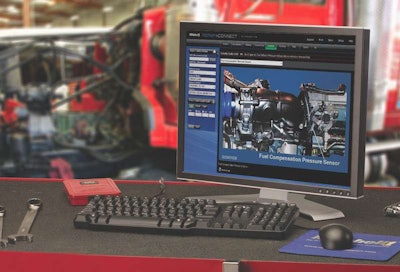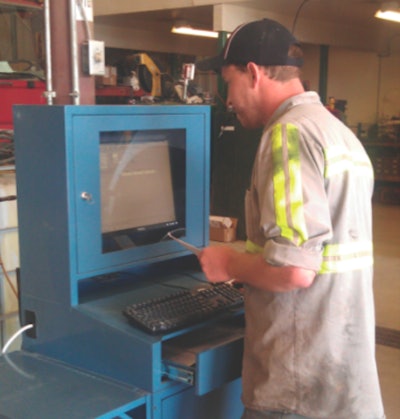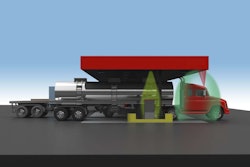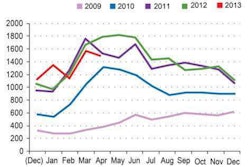 Subscribers to Mitchell 1’s online diagnostic and repair information programs automatically receive new information as it becomes available, allowing technicians to find what they are looking quickly for regardless of brand or model of truck and engine.
Subscribers to Mitchell 1’s online diagnostic and repair information programs automatically receive new information as it becomes available, allowing technicians to find what they are looking quickly for regardless of brand or model of truck and engine.In Part 1 of the “Smart Shops” series, Equipment Editor Jack Roberts takes a look at the benefits of investing in modern shop technology and how fleets who don’t upgrade are wasting lots of time and money and leaving themselves at a disadvantage competitively. Part 2 will cover how to start and work through the process of investing. See it here.
When Jerry Simmons joined Florida-based refuse hauler Advanced Disposal Services two years ago as a fleet manager, the shop’s preventive maintenance schedules still were being written down on a whiteboard in the bay. Today, the fleet is a client of fleet maintenance software provider Arsenault Associates, and Simmons says the change has been dramatic.
“With the board, things were always falling through the cracks,” Simmons says. “But today, I know at the beginning of each week what my PM schedule looks like at a glance. At the same time, I can deal with unscheduled repairs more quickly and effectively, and I can track anything unusual going on. If we’re getting a high volume of component failures, I can take steps to fix it on our end, or I can contact the OEM and let them know they’ve got an issue they need to resolve.”
Smart shops are not coming; they are already here. And if a fleet’s technicians still are flipping through maintenance books to verify repair procedures or huddling around an old green-screen computer to find a part, that fleet is blowing precious man-hours and money in wasted time and inefficient operations. Moreover, it’s likely the fleet is operating in an information void, with little or no captured data on repairs, vehicle histories and warranty information – to name a few vital statistics.
Not taking the plunge
Corporate culture notoriously is hard to change, and nowhere in the fleet dynamic is the old “we’ve always done it that way” attitude more firmly ingrained than in the shop. A recent Arsenault Associates-sponsored survey found that one-third of fleets still are using no computer-based technology – using only whiteboard scheduling and paper tracking – in their maintenance practices.
 Two years ago, preventive maintenance schedules for Florida refuse hauler Advanced Disposal Services still were being written down on a whiteboard in the bay. Today, the fleet is a client of fleet maintenance software provider Arsenault Associates.
Two years ago, preventive maintenance schedules for Florida refuse hauler Advanced Disposal Services still were being written down on a whiteboard in the bay. Today, the fleet is a client of fleet maintenance software provider Arsenault Associates.But shop and repair technology is an incredibly powerful tool that can transform a fleet’s maintenance department – with benefits that can trickle down through every of aspect of a fleet’s operations. Thanks to major advances in handheld and wireless technology, today’s smart shops begin compiling data before an ailing rig even pulls into the yard.
“Some companies are implementing not just technology tools, but capturing workflow practices and methods, evaluating how technicians and managers are spending their time and taking steps to optimize both cost and productivity,” says Bob Hausler, Arsenault’s vice president of marketing and technology.
Even better, these new systems can be installed quickly, have fast learning curves for both technicians and managers alike and can yield quick ROI times. And beyond simple payoff on the technology investment, shop technology systems can help fleets spec smarter and more productive vehicles at purchase time, influence driver behavior to boost fuel economy and turn warranty tracking from a hassle to a positive on the company books.
While these benefits are taken as gospel by many large fleets, some small and even medium-sized fleets remain hesitant to take the technology plunge, says Ric Bedard, president of Cetaris. “In most operations we see, the shop typically has the oldest equipment,” Bedard says. In some cases, the shop is viewed as a cost center, so it doesn’t get the same attention as the organization’s profit centers, he says.
Use of good technology for maintenance is no longer a bleeding-edge idea that brings significant risk, Hausler says. “No one would ever consider outfitting their accounting department with an abacus or calculator instead of a computer and business software,” he says. “But that’s what is still happening in the maintenance dimension in far too many shops.”










